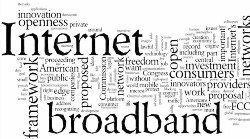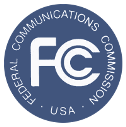 How many of you are aware of an issue that’s been called “Net Neutrality”? If you aren’t already, it will be coming to your town soon—WHOA!- It’s already there!
How many of you are aware of an issue that’s been called “Net Neutrality”? If you aren’t already, it will be coming to your town soon—WHOA!- It’s already there!
Quickly explained, “neutrality” is what has governed the Internet and that means basically–nothing. Internet content, and accessibility to it, has been on a neutral plane with no guardian at the gate determining what goes through and what doesn’t. Neutrality is what built the internet into the global, free speech communication system that we have.
Network providers like Comcast, AT&T, and Verizon, however, want to control the content and accessibility to it.
They would scale platforms with varying fees and become the “guardians” determining what information goes through and the connectivity to it. By controlling the quality of content they will have the ability to reduce competition, thereby creating a huge profit opportunity.
The neutrality that has been the platform for free speech on the Internet began to change about a month ago as Verizon won an appeals court challenge to U.S. equal treatment rules for the Internet. The U.S. Court of Appeals in Washington sent the rules governing what’s known as “net neutrality” back to the Federal Communications Commission, saying the agency overreached in barring broadband providers from slowing or blocking selected Web traffic.
The FCC rules required high-speed Internet providers that use fiber- optic or other cable to treat all traffic equally and disclose their network practices. The challenge to this rule could leave companies such as Netflix and Amazon facing higher charges for the fastest service.
 For the record, the mission of the FCC is to “make communication services available…to all the people of the United States, without discrimination on the basis of race, color, religion, etc.” As the technologies of radio and television expanded, the corporate interests of “Networks” monopolized airtime to diminished affiliate programming (compromising the free market and free speech) and the FCC was created.
For the record, the mission of the FCC is to “make communication services available…to all the people of the United States, without discrimination on the basis of race, color, religion, etc.” As the technologies of radio and television expanded, the corporate interests of “Networks” monopolized airtime to diminished affiliate programming (compromising the free market and free speech) and the FCC was created.
Ironically, the loudest opposition to Net Neutrality comes from those “Constitutional Purists” who call themselves “The Tea Party” who claim to stand for individual liberty as their preeminent ideal. The head of one tea party organization says she is concerned that the policy (net neutrality) would increase government regulation and power, calling net neutrality one of many “assaults on individual liberties.”
In a letter to the FCC, the Tea Party group wrote: “Despite universal acknowledgement that Americans enjoy a free, open, and vibrant internet, the FCC is relentlessly pursuing a massive regulatory regime that would stifle broadband expansion, create congestion, slow internet speeds, jeopardize job retention and growth, and lead to higher prices for consumers.”
Chairman of the Virginia Tea Party Patriot Federation Jamie Radtke contends that the Tea Party has been increasingly concerned with the issue of net neutrality. “It’s starting to get onto the radar now,” she said. “I think the clearest thing is it’s an affront to free speech and free markets.”
 So, in other words….the position of the Tea Party is that by allowing communication corporations to determine and regulate what goes over the internet and to charge fees for tiered programs to access it; that is a better realization of free speech than it would be to keep them out and allow the system to operate without such restrictions.
So, in other words….the position of the Tea Party is that by allowing communication corporations to determine and regulate what goes over the internet and to charge fees for tiered programs to access it; that is a better realization of free speech than it would be to keep them out and allow the system to operate without such restrictions.
That’s nuts, isn’t it?
But, in reality their voices are being bankrolled by people like Dick Armey and the corporate interests that want to control our content. So, I guess it does make sense now, doesn’t it?
Do the architects of this opposition believe that a corporate takeover of an information system is the Free Market at work?!
Well…their money does.
Government is the line of protection between us (the People) and the interest of big business to increase profits at our peril. Those profits, by the way, come out of our pockets. This corporate-pandering “Armey” of zealots are using their agenda as a defense of “freedom” and a warning of “the encroachment of government” and then disseminating that message to the rank and file who wear tricorn hats, holding muskets from Walmart’s toy department, in Bank of America parking lots.
The most basic political issues come to bear here: What is the role of government? When does it protect us and when can our freedoms be diminished? Who and what will best defend the interests of the People? What are the interests of the information providers (the essential free press) and who controls the messages we receive?
It is with this knowledge that we form our opinions and those opinions are what shape and protect our freedom.
I will close with a statement a friend of mine (Paul Barrosse) wrote last year in his own blog: “Our representative government is what stands between us and the rapacious depredations of a corporate oligarchy that’s been amassing money and power at a clip not seen since the Gilded Age of the Robber Barons. Our common fight isn’t against Big Government, which protects our water, food and air — and provides a host of other services and protections that individual Americans cannot provide on their own. Rather, we must be vigilant about the rise of corporate personhood and power.”
Well said, sir, well said.